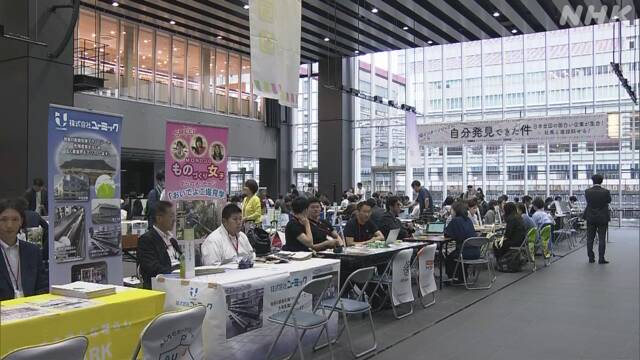In order to deepen understanding of companies through internships that allow students to experience work in the workplace, a briefing session on internships for university students and others by small and medium-sized enterprises was held in Tokyo on September 9.
This briefing session was held by an organization of small and medium-sized business owners from all over Japan, and about 70 companies nationwide participated.
At the venue, company representatives introduced what kind of work they were doing to the visiting students and explained the contents and duration of the internship.
One of the students who participated said, "I participated from Saitama City, but I was grateful to hear information about Osaka and Kyushu."
In addition, a person in charge of the company said, "Some students were interested in the internship at our company, and I told them that what they wanted to do and what they were doing now at the company would be sufficiently linked."
Regarding internships, companies are reviewing the content and duration of internships, as the government has allowed companies to use student information for recruitment activities if they meet certain conditions for the current third-year university students who will graduate in the spring of 1.
Hideaki Kawanaka, Chairman of the Joint Recruitment Committee of the National Council of Small and Medium Enterprise Entrepreneurs' Associations, who held the briefing, said, "In order to fully demonstrate the corporate value of each company, we must become a company that can properly provide internships.
Companies that participated in order to attract students' interest from an early stage
Some of the participating companies are working to attract students' interest from an early stage, such as reviewing the content of internships for third-year university students.
A company in Sendai City that handles the restaurant and amusement businesses is focusing on hiring new graduates for full-time employees amid the ongoing labor shortage of part-time and part-time workers.
Until now, HR personnel have been assigned concurrent positions with regular duties, but in May last year, we assigned a specialist in charge to respond to the accelerated recruitment process.
In addition, with regard to internships, in light of the government's review of the rules, we are focusing on enhancing the curriculum for third-year university students from this fiscal year in order to promote their use in recruitment activities.
Until now, we had implemented a uniform curriculum centered on customer service at stores for students who wanted to work in any occupation, but we decided to divide it into a course for technical professionals who make bread and soba in the restaurant business department and a course for management who is responsible for store management and management.
The content of the training has also been changed to provide more practical experience, such as developing new recipes, cost accounting, and conducting market research of other companies in the same industry.
In addition, the implementation period, which used to be as short as one day, will be increased to five days or more from this fiscal year.
Toshifumi Kasukawa, CEO of Paramount, said, "The most important thing is to eliminate mismatches, so I would like them to find out what they want to do in the future through the training. I was talking.
Revision of rules regarding internships
The ideal form of internships has been discussed since January 2019 by a council formed by Keidanren and university leaders.
While the discussion progressed that internships are intended to support students' career development and are not recruitment activities, that student information should be available for recruitment activities only for internships that meet certain conditions.
Based on this, the government has revised the rules regarding internships from the current third-year university students who will graduate in the spring of 1.
Specifically, companies can use the information of students who participated in internships as a basis for hiring decisions, provided that the period is 2025 days or more, and more than half of the days are devoted to work experience in the workplace, and employees provide guidance to students and provide feedback after completion.
As a specific way of using it, for example, if you conduct a job interview after June, which is supposed to start according to the government rules, you can partially exempt the selection process based on the information obtained from the internship.
In addition, in April, the government announced a policy to bring the start of interviews forward by about three months to spring break or later, for current university second-year students who will graduate in the spring of 3 and for whom the company judges them to be highly specialized through internships of two weeks or more.
Along with these developments, some companies are reviewing the content and duration of internships.

